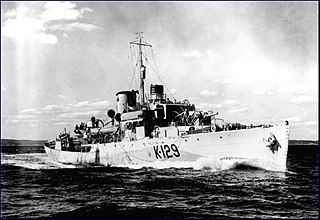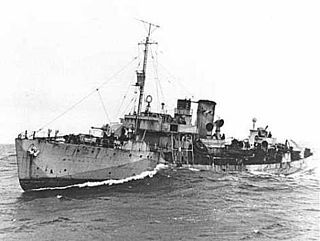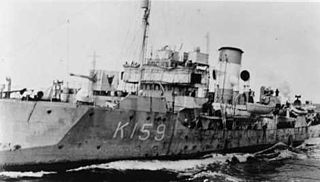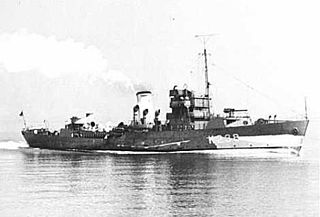
HMCS Oakville was a Royal Canadian Navy Flower-class corvette which took part in convoy escort duties during the Second World War. She fought primarily in the Battle of the Atlantic. After the war she was sold to the Venezuelan Navy. She was named after Oakville, Ontario.

HMCS Kitchener was a Royal Canadian Navy revised Flower-class corvette which took part in convoy escort duties during the Second World War. She fought primarily in the Battle of the Atlantic. She was named for Kitchener, Ontario. The vessel was originally named HMCS Vancouver but was renamed in November 1941 before the ship was launched.

HMCS Charlottetown was a Flower-class corvette that served the Royal Canadian Navy during the Second World War. Charlottetown's pennant number K244 is unique in that it was also used for HMCS Charlottetown, a River-class frigate.

Western Local Escort Force (WLEF) referred to the organization of anti-submarine escorts for World War II trade convoys from North American port cities to the Western Ocean Meeting Point near Newfoundland where ships of the Mid-Ocean Escort Force (MOEF) assumed responsibility for safely delivering the convoys to the British Isles.

HMCS Brantford was a Flower-class corvette that served in the Royal Canadian Navy during the Second World War. She served primarily as a convoy escort in the Battle of the Atlantic. She was named for Brantford, Ontario.

HMCS Agassiz was a Flower-class corvette of the Royal Canadian Navy. She served primarily in the Battle of the Atlantic as an ocean escort for convoys during the Second World War. She was named after the community of Agassiz, British Columbia.

HMCS Battleford was a Flower-class corvette of the Royal Canadian Navy during the Second World War. She served primarily in the Battle of the Atlantic. After the war she was sold to the Venezuelan Navy and renamed Libertad.

HMCS Dawson was a Flower-class corvette that served in the Royal Canadian Navy (RCN) during the Second World War. She was one of the few Canadian corvettes to serve in action in both oceans. She was named for Dawson City, Yukon.

HMCS Baddeck was a Flower-class corvette that served with the Royal Canadian Navy during the Second World War. She served in several theatres of operations during the war. After the war the ship was retired but the ship's name, pennant number and badge continue to be used by the K147 Baddeck Royal Canadian Sea Cadets Corps.

HMCS Arrowhead was a Flower-class corvette that was originally commissioned by the Royal Navy but served primarily with the Royal Canadian Navy (RCN) during the Second World War. She fought primarily in the Battle of the Atlantic as a convoy escort. She was named for Sagittaria, which is an aquatic water plant that is sometimes known as Arrowhead.

HMCS Arvida was a Flower-class corvette that served with the Royal Canadian Navy during the Second World War. She served primarily in the Battle of the Atlantic as a convoy escort. She was named for Arvida, Quebec.

HMCS Dunvegan was a Flower-class corvette that served with the Royal Canadian Navy during the Second World War. She served primarily in the Battle of the Atlantic. After the war she was sold to the Venezuelan Navy. She was named for Dunvegan, Inverness County, Nova Scotia.

HMCS Fennel was a Flower-class corvette that served primarily with the Royal Canadian Navy during the Second World War. Originally commissioned into the Royal Navy, she served as an ocean escort in the Battle of the Atlantic.

HMCS Hepatica was a Flower-class corvette that served primarily with the Royal Canadian Navy during the Second World War. She saw service in the Battle of the Atlantic as an ocean escort. Originally commissioned into the Royal Navy, she was loaned to Canada in 1941.

HMCS Kamsack was a Flower-class corvette that served with the Royal Canadian Navy during the Second World War. She served primarily in the Battle of the Atlantic as an ocean escort. She was named for Kamsack, Saskatchewan.

HMCS Chicoutimi was a Flower-class corvette that served with the Royal Canadian Navy during the Second World War. She served primarily in the Battle of the Atlantic as an ocean escort. She was named for Chicoutimi, Quebec.

HMCS Morden was a Flower-class corvette that served with the Royal Canadian Navy during the Second World War. She fought primarily in the Battle of the Atlantic as an ocean escort.

HMCS Ville de Québec was a Royal Canadian Navy revised Flower-class corvette which took part in convoy escort duties during the Second World War. She fought primarily in the Battle of the Atlantic. She was named for Quebec City, Quebec. Following the war, the ship was sold to commercial interests, in service until 1952.

HMCS Vancouver was a Flower-class corvette that served with the Royal Canadian Navy during the Second World War. She saw action primarily in both Atlantic and Pacific theatres. She was named for Vancouver, British Columbia. She was the second commissioned ship and the third overall to bear the name Vancouver.

HMCS Woodstock was a Royal Canadian Navy revised Flower-class corvette that took part in convoy escort duties during the Second World War. She fought primarily in the Battle of the Atlantic. She was named for Woodstock, Ontario.
This page is based on this
Wikipedia article Text is available under the
CC BY-SA 4.0 license; additional terms may apply.
Images, videos and audio are available under their respective licenses.



















